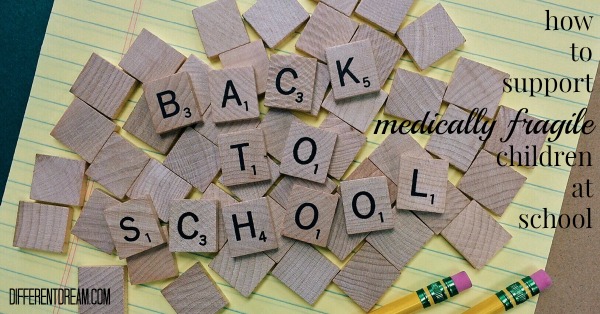4 Ways to Support Medically Fragile Children at School

Medically fragile children at school need support from parents and school staff. Guest blogger Deborah Arrona is here to share 4 lessons she learned during the 2 1/2 year when her medically fragile daughter transitioned from homebound instruction to full days at school.
Four Ways to Support Medically Fragile Children at School
Fall is my favorite season and I am thrilled it is finally upon us. While many families are already diving into fall season staples like football games and pumpkin patches, the same can’t be said for all medically fragile children at school. My daughter is still adjusting to being back at school for the full day for the first time in 2 1/2 school years.
My daughter’s name is Aria and she is a beautiful, sassy 12-year-old living with multiple medical fragilities as a result of her micro-preemie birth at 25 weeks. She requires total caregiver/aide assistance for all tasks, wants and needs. She lives with Spastic Quadriplegia Cerebral Palsy, a neurological disorder producing very tight, painful muscle spasms all over her body. She had a Baclofen Pump placed as a last resort for treatment and pain relief when she was in 4th grade. The surgery required 6 weeks of bed rest and recovery at home.
In December of that same year Aria had the first of several bouts of pneumonia that kept her out of school, receiving homebound instruction for the rest of 4th and 5th grade. She began to exhibit new symptoms pointing towards respiratory distress and possibly pneumonia. Aria absolutely loves public school so already missing so much school was very difficult for her.
Grade 5 ended with Aria doing much better. Talks of her returning to school began after spring break. Her medical team was still concerned with Aria’s risk of infection due to how overwhelmed her body and immune system were so they decided to play it safe with her return to school in grade 6. They recommended half days with intermittent homebound instruction as needed. The members of Individualized Education Plan (IEP) committee, Aria’s dad and I agreed. As eager as Aria and the rest of us were for her to return to school we knew this would be a much better plan that would set her up for success in the long run.
Grade 6 was Aria’s return to school on campus for half days in the afternoon. Even though it was only 4 hours on weekdays, Aria was thrilled to be back at school interacting with people, hanging out with old friends, making new friends and blossoming into a beautiful young lady. She was very successful in grade 6 with her half day schedule, so we figured it was time to try going back to a full day schedule in her life skills class on her school campus in 7th grade.
Over the summer we tried to prepare for full days at school with outings. But we are in Texas and it was too hot for Aria to be out most days. I tried to keep her engaged for most of the hours she would be at school hoping it would help in her transition. The first two days of Grade 7 were wonderful. However, going back full time after so long was a bigger adjustment than expected. Aria has been having trouble with muscle spasticity, congestion, and lethargy. Her school team and medical teams have both been doing well to try to help Aria with these issues, but currently they are still issues.
Here are four ways I learned to support medically fragile children at school over the past 2 1/2 years:
#1: Be Patient
The process of meeting with school staff at the same time to make decisions based on doctors’ orders while keeping my own ideas about what’s best for Aria is quite the ordeal that requires great patience. School protocol and policy can make things interesting. Consistent communication on both ends helped fine tune my patience. Written documentation in daily folders/notebooks, text messages, emails and phone calls help the school know how Aria is doing at home and help me know how she’s doing at school. That in turn helps Aria’s medical team and her parents understand how she is doing on a daily basis.
#2: Extend Grace
Extending grace to the schools was a challenge for me at first. I am so used to what our normal is I forget that it’s only normal for our family. When a durable medical equipment arrives in a classroom or school staff have to be trained to identify seizure activity and symptoms of respiratory distress, I had to remember that many schools have never before been prepared for that even though they welcome inclusion. At first it felt like the school didn’t want to help. Eventually I realized what I already knew: the school is ultimately on my team, which is Team Aria. We all care about her. We all want to do the right thing. We are all in this together. It’s not always been smooth sailing since that realization, but it helps me a lot.
#3: Be an Encourager
For me, this is the main takeaway, and it aligns perfectly with patience and grace. Saying thank you or extending a compliment to the school staff caring for Aria helps more than anything else. In times when things aren’t going well, a simple acknowledgment about what is going right can turn things around 180 degrees. I encourage the school by thanking people for listening to me, communicating regularly, and doing the best they can with what is available to them. The school also encourages me with compliments on how I care for Aria and communicate her needs and personality. The best encouragement is Aria who encourages me and the school by showing up when she can and doing her best while she is there.
#4: Cling to Faith
Above and beyond all that our faith has been extraordinarily helpful in all our adjustments. We have seen God move in a mighty way in Aria’s life especially with her medical care and education. All things considered, Aria is doing well. We look forward to watching her continue to grow, heal, and live as long as she is able to. Her journey on campus and at home reminds me of The Message translation of Ecclesiastes 5:19.
Yes, we should make the most of what God gives,
both the bounty and capacity to enjoy it,
accepting what’s given and delighting in the work.
It’s God’s gift!
How Do You Support Medically Fragile Children at School?
Do you have or work with medically fragile children at school? What tips would you add to what Deborah shared? Leave a comment.
Do you like what you see at DifferentDream.com? You can receive more great content by subscribing to the quarterly Different Dream newsletter and signing up for the daily RSS feed delivered to your email inbox. You can sign up for the first in the pop up box and the second at the bottom of this page.

By Deborah Arrona
Deborah Arrona is a stay-at-home mom to Aria, a sweet and beautiful tweenage, 25 week micro-preemie survivor. Aria loves music and rolling in her wheelchair outside. She lives with multiple, medically-complex special needs such as Periventricular Leukomalacia, Cerebral Palsy, Epilepsy, Cortical Visual Impairment, and use of a feeding tube. Deborah and her husband, Salvador, are raising Aria together in the Houston area. When Deborah has time she enjoys singing, reading, movies, music and posting updates about Aria at Facebook.com/TeamAriaArrona.
Subscribe for Updates from Jolene
Related Posts
Jesus Loves Me This I Know
Mark Arnold takes comfort and encouragement from his son’s rendition of “Jesus Loves Me,” which has been shared with so many.
Does God Speak Dutch?
Guest Blogger Steve Harris ties a favorite Christmas movie to a favorite poem to bring encouragement to special needs parents.
This Thanksgiving I’m Grateful for Grief
“This Thanksgiving, I’m grateful for grief” is not something you hear a lot. Jolene explains why this is her heart this Thanksgiving.






0 Comments